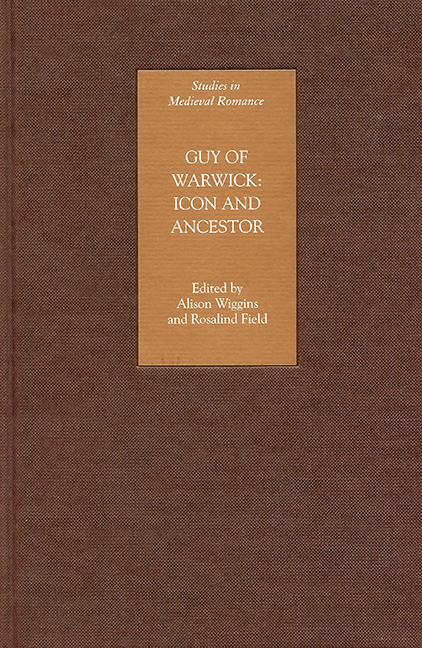Book contents
- Frontmatter
- Contents
- Illustrations
- Contributors
- Abbreviations
- Dedication
- Editorial Introduction: Namoore of this! How to read Guy of Warwick and why
- 1 Gui de Warewic at Home and Abroad: A Hero for Europe
- 2 Gui de Warewic in its Manuscript Context
- 3 Guy of Warwick as a Translation
- 4 From Gui to Guy: The Fashioning of a Popular Romance
- 5 The Manuscripts and Texts of the Middle English Guy of Warwick
- 6 The Speculum Guy de Warwick and Lydgate's Guy of Warwick: The Non-Romance Middle English Tradition
- 7 An Exemplary Life: Guy of Warwick as Medieval Culture-Hero
- 8 The Visual History of Guy of Warwick
- 9 ‘In her owne persone semly and bewteus’: Representing Women in Stories of Guy of Warwick
- 10 Of Dragons and Saracens: Guy and Bevis in Early Print Illustration
- 11 Guy of Warwick and The Faerie Queene, Book II: Chivalry Through the Ages
- 12 Guy as Early Modern English Hero
- Appendix: Synopsis of the Guy of Warwick narrative
- Index
2 - Gui de Warewic in its Manuscript Context
Published online by Cambridge University Press: 24 October 2017
- Frontmatter
- Contents
- Illustrations
- Contributors
- Abbreviations
- Dedication
- Editorial Introduction: Namoore of this! How to read Guy of Warwick and why
- 1 Gui de Warewic at Home and Abroad: A Hero for Europe
- 2 Gui de Warewic in its Manuscript Context
- 3 Guy of Warwick as a Translation
- 4 From Gui to Guy: The Fashioning of a Popular Romance
- 5 The Manuscripts and Texts of the Middle English Guy of Warwick
- 6 The Speculum Guy de Warwick and Lydgate's Guy of Warwick: The Non-Romance Middle English Tradition
- 7 An Exemplary Life: Guy of Warwick as Medieval Culture-Hero
- 8 The Visual History of Guy of Warwick
- 9 ‘In her owne persone semly and bewteus’: Representing Women in Stories of Guy of Warwick
- 10 Of Dragons and Saracens: Guy and Bevis in Early Print Illustration
- 11 Guy of Warwick and The Faerie Queene, Book II: Chivalry Through the Ages
- 12 Guy as Early Modern English Hero
- Appendix: Synopsis of the Guy of Warwick narrative
- Index
Summary
The Anglo-Norman poem Gui de Warewic was composed in the early thirteenth century, and survives in six fragments and ten mauscripts. While the survival of only a few manuscripts or even fragments does not preclude the text or at least the narrative being well known, survival of a large number of manuscripts does indicate a text of some popularity. The sixteen extant manuscripts and fragments of Gui is a good number for a text of this type. It is, in fact, more than any of the other so-called ‘ancestral romances’. For example, Waldef survives in only one manuscript, as does Fouke le Fitz Waryn, while Haveloc survives in two. Although five manuscripts and fragments exist of Horn none is complete. Boeve has a more complex manuscript tradition as it survives in several forms, three in continental French. The extant manuscripts of Gui can give us some clues about the reception, as well as the popularity of the tale.
Gui de Warewicin single-text manuscripts and fragments
The complete text runs to nearly 13,000 lines. Many of the manuscripts, however, are incomplete, with lacunae or missing folios, and six of the extant manuscripts are relatively short fragments:
Cambridge, University Library, Additional MS 2751 (J)
This is a fragment of manuscript which had been used as a binding. It is a very short piece of text corresponding to lines 7389–522 of Ewert's edition. The date is difficult to determine and has been variously placed in the thirteenth and the early fourteenth centuries. It is a manuscript of middle quality with some rubricated capital initials; the first letters of the lines are also touched in red. The orthography of the text is Anglo-Norman.
Nottingham University Library, Oakham Parish Library, MS Bx 1756 S 4 (N) This is a single leaf with text corresponding to lines 11,794–941 of the edition. Dating from the last third of the thirteenth century this fragment consists of two strips (190cm x 50cm and 190cm x 55cm) which had been used to reinforce the binding of an early printed book of sermons from Oakham Parish Library. It includes one five-line rubricated initial ‘P’.
- Type
- Chapter
- Information
- Guy of Warwick: Icon and Ancestor , pp. 12 - 26Publisher: Boydell & BrewerPrint publication year: 2007

